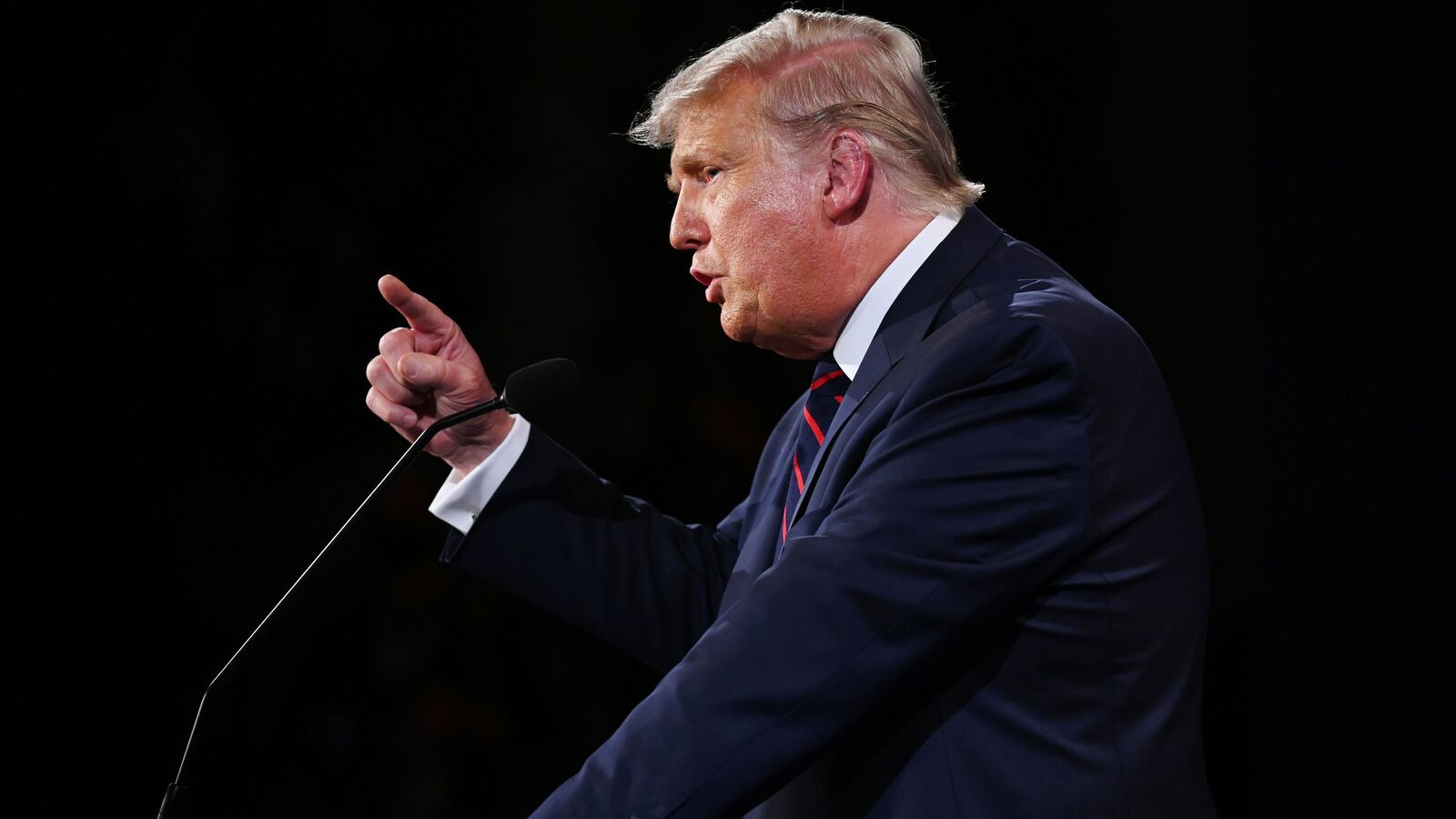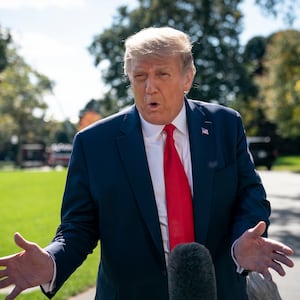The truck-revving, banner-waving, loudspeaker-blaring pro-Trump rally took place, conveniently, on Sept. 19, the first Saturday of early voting in the swing state of Virginia, in a parking lot where voters in Democratic-leaning Fairfax County were lined up to cast their ballots. Some Trump supporters drove circles around the voters while others—many without face masks—mingled with the line, chanting and waving flags.
“We had a couple poll observers there that had to actually escort voters in because we saw people that would get to the edge of the parking lot, and see this giant group of Trumpers yelling and screaming,” Jack Kiraly, executive director of the Fairfax County Democratic Committee, told The Daily Beast, adding that the scene reminded him of the volunteers who escort people past anti-abortion protesters outside women’s health clinics.
So during Tuesday night’s remarkably unhinged presidential debate, when President Donald Trump urged his supporters to take unsanctioned actions at polling places, Kiraly was reminded of what Fairfax County voters had witnessed earlier this month.
During the debate, Trump appeared to tell the far-right paramilitary group the Proud Boys to “stand by” and urged fans to “go into the polls and watch very carefully” for voter fraud, an exceedingly rare phenomenon Trump has crafted into a cornerstone of his political identity. For close observers of the far right, as well as officials like Kiraly, the remarks amounted to the latest warning that an embattled president might use his supporters to impede fair elections, or to cast the results of those elections in doubt.
If the prospect of election-related violence was already looming over the first presidential contest since Trump effectively welcomed the paramilitary far-right into the Republican Party, the debate made the alarm bells ring even louder.
“The two things that concerned me most were the remarks about the Proud Boys, basically incentivizing these armed militiamen who are loyal to him to show up at polling places,” Kiraly said, “and then his comment saying they’re going to have observers there. They are related. I think he was incentivizing those Proud Boys to go inside.”
The Proud Boys are an explicitly violent right-wing group with extensive ties to white supremacists and disturbing connections to more mainstream Republicans. Trump’s comments about the group came when debate moderator Chris Wallace asked him to condemn “white supremacists and right-wing militias.” Trump’s debate opponent, former Vice President Joe Biden, specifically urged Trump to condemn the Proud Boys, who are often visible in Portland, Philadelphia, and New York, where two members were convicted of gang assault and other crimes in 2018.
Trump did not do so. “Proud Boys, stand back and stand by,” he said. “But I’ll tell you what, somebody’s got to do something about antifa and the left.”
On Wednesday, Trump attempted to walk back the comments, claiming that he did not know who the Proud Boys are, and that they should stand down. (The current leader of the Proud Boys sat directly behind Trump at a 2019 rally, and was a Florida director of Latinos for Trump as of last year.)
Even if Trump were telling the truth on Wednesday, his words have already energized the far right around elections, according to Kathleen Belew, history professor at the University of Chicago and author of Bring the War Home: The White Power Movement and Paramilitary America.
“He didn't tell the Proud Boys to stand down. He told them to stand back and stand by,” Belew told The Daily Beast.
“That's a call for readiness,” she explained. “Of course that leads us to a set of questions about readiness for what. One of the things to understand about this movement is that adherence to ‘stand back and stand by’ does not necessarily mean adherence to the person that gave that marching order, or to what might come afterward. I think part of the concern here is that he simply can't unring the bell in this kind of situation.”
The Proud Boys capitalized on Trump’s comments even before the debate’s end, putting his words on memes and t-shirts. But the far-right glee at the prospect of presidential permission for election-related violence wasn‘t confined to one group.
Andrew Anglin, the founder of the neo-Nazi website the Daily Stormer, wrote a post-debate blog post that reiterated Trump’s baseless claims that Democrats would attempt election fraud, and claimed that “Trump is ready for a war in the streets.” (Anglin cannot personally participate in said war on the streets because he has gone AWOL while avoiding an ongoing lawsuit and tens of millions in civil penalties from previous lawsuits.)
Far-right interference with free elections has a long history, especially when aimed at Black people, Belew noted.
“During Reconstruction, after the Civil War, during the 1920s, during the Civil Rights movement, attempts to keep people from exercising their legal right to vote were as intrinsic to white supremacy and white power groups as a burning cross,” she said. “It’s one of the textbook, central strategies.”
Election trickery also has a history with less-fringe right groups. Devin Burghart, executive director of the Institute for Research & Education on Human Rights, a social justice non-profit, pointed to the so-called “Brooks Brothers Riot” in late November 2000. While election canvassers in Florida’s hotly contested Miami-Dade County gathered to count ballots, a mob of paid operatives pounded on doors and windows, and punched a Democratic official, intentionally interfering with ballot counting.
Burghart noted that the riot was allegedly organized in part by GOP operative Roger Stone, who is now closely affiliated with the Proud Boys. The group has provided security for him, and in turn he has recently endorsed one of them for office in Hawaii and appeared to participate in a Proud Boy initiation stunt.
“Given the Trump orbit’s connection to the Proud Boys and given his advisors’ connections to previous voting meddling efforts,” Burghart said, “there is certainly a concern both for violence on Election Day coming from groups like the Proud Boys and, should there not be a clear victor on November 3, for potential violence and meddling in the electoral process after Election Day.”
Contacted via text message about Trump’s Proud Boy comments, Stone responded with a paragraph-long rant about anti-fascists, and did not respond to a follow-up question.
The threat isn’t just from Proud Boys, Burghart emphasized, but also from the larger network of paramilitary groups that have voiced support for Trump. Some of those groups are not cohesive militias, but recurring pro-Trump rallies, like a series of caravans in Oregon organized by pro-Trump Facebook pages.
Those Oregon events often begin much with truck caravans and Trump flags—much like the event in Fairfax County that saw pro-Trump activists cross through an early voting line.
“It’s no longer an election day, it’s an election season,” Kiraly said. “We need to be vigilant at all times, and we need to call out these instances of voter intimidation, of encouraging voter intimidation that way that the president did last night.
“We need to shame that stuff.”





